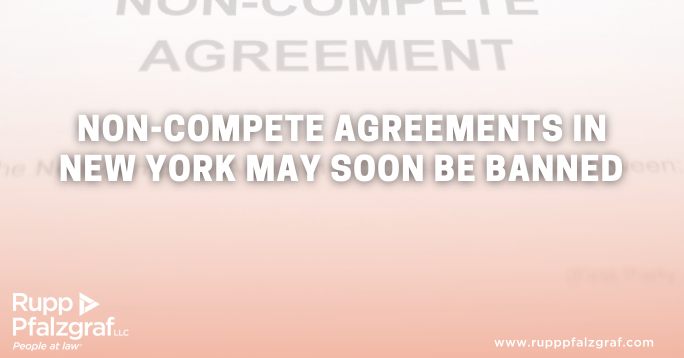
Written by: Matt Miller
Any day now New York Governor Kathy Hochul may sign into law a bill recently passed by the legislature, in swift fashion, that would prohibit New York employers from entering into employee non-compete agreements once the law becomes effective thirty (30) days after the Governor signs it. This is a major development for New York employers, and a major “domino” so to speak in the growing movement across the country by other states and federal agencies, such as the National Labor Relations Board and the Federal Trade Commission, to eliminate the use of these restrictive covenants.
First, it is important to note that the new amendment to the New York Labor Law would prohibit any non-compete agreement signed or modified after the law’s effective date. It is not, however, retroactive, meaning existing non-competes would remain in effect and be enforceable (assuming they otherwise protect a legitimate interest and are reasonable in scope and duration under the law). The new law defines “non-compete agreement” as any agreement, or provision contained in any agreement, that prohibits or restricts a worker from obtaining employment after the conclusion of employment with the employer that is a party to the agreement. Independent contractors also may be covered by this ban, if the independent contractor is in a position of economic dependence on the employer.
This new law is sweepingly broad, and appears to provide only the following limited exceptions (assuming the following agreements do not otherwise restrict competition in violation of the new law):
- “Fixed-term of service” agreements with covered individuals;
- Agreements that protect trade secrets;
- Agreements that protect confidential and proprietary client information; and
- Agreements that prohibit the solicitation of clients of the employer that the covered individual learned about during employment with the employer.
When it comes to enforcement of violations of the new law, covered individuals will be given a statutory right to sue their employer within two years of (I) the date the prohibited non-compete was signed; (ii) the date the employee or contractor learns of the prohibited non-compete agreement; (iii) the date employment or the contractual relationship is terminated; or (iv) the date the employer takes any step to enforce a non-compete agreement. As part of any such lawsuit, the covered individual will be able to pursue voiding any non-compete that violates the law, obtaining injunctive relief against enforcement, and recovery of lost compensation, damages, and reasonable attorneys’ fees and costs. By statute, “the court shall award liquidated damages to every covered individual affected under this section,” which are capped at $10,000.
Significantly, unlike the proposed FTC ban on non-competes, this new New York law does not address at all the common use of non-compete agreements in transactions concerning the sale of a business. Historically, courts have been far more lenient in finding non-competes in this context enforceable, but it will take time for this issue to make its way through the courts to see how they interpret it outside of the traditional employment context.
Matt Miller, Erin Ryan, or any member of the Rupp Pfalzgraf Employment Law Team is available to answer questions on this new development and how it relates to your business.

